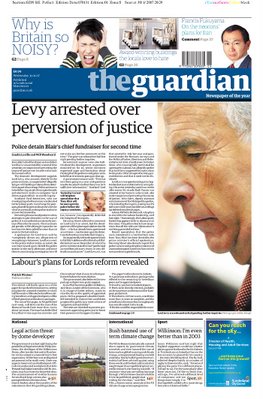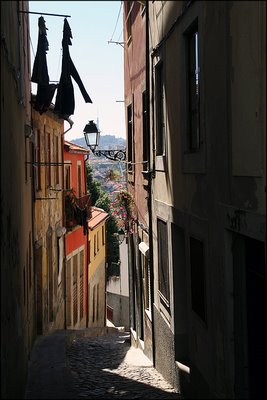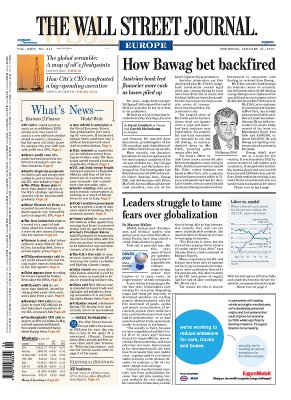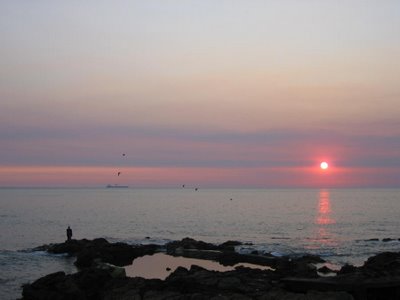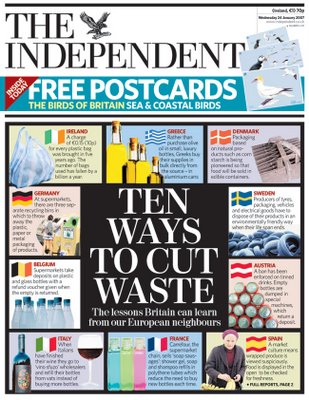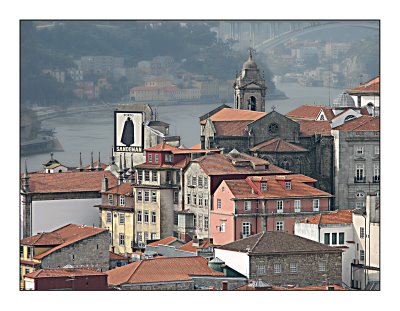Wednesday, January 31, 2007
Top 10 Internet Scandals of All Time
2. A Real Page Turner
The "overly friendly" interest that Representative Mark Foley (R-Florida) had in young male congressional pages wasn't really news to Washington, D.C.'s inner circle. But it took the Net--and ABC reporter Brian Ross--to expose Foley's predilections to the world.
When ABC published the transcripts of Foley's explicit text messages with an underage volunteer last September, not even the slickest Beltway spinmeister could shrug them off as benign. Foley's disgrace may not have brought about the Republican electoral debacle last November, but it didn't help his or his party's cause.
The "overly friendly" interest that Representative Mark Foley (R-Florida) had in young male congressional pages wasn't really news to Washington, D.C.'s inner circle. But it took the Net--and ABC reporter Brian Ross--to expose Foley's predilections to the world.
When ABC published the transcripts of Foley's explicit text messages with an underage volunteer last September, not even the slickest Beltway spinmeister could shrug them off as benign. Foley's disgrace may not have brought about the Republican electoral debacle last November, but it didn't help his or his party's cause.
David Sylvian - Red Guitar
Promo Video. The first single from David's debut album "Brilliant Trees", the video features legendary photographer Angus McBean (part of the video is based on one of his photographs)and was directed by Anton Corbijn.
Promo Video. The first single from David's debut album "Brilliant Trees", the video features legendary photographer Angus McBean (part of the video is based on one of his photographs)and was directed by Anton Corbijn.
Biofuel 1
 Energy’s Great Green Hope
Energy’s Great Green HopeAs crops supplant oil as an energy source, the economics of agriculture are being rewritten
By John Carey
Ever since our ancestors in the Fertile Crescent first figured out how to grow grains, crops have been used mainly to feed people and livestock. But now that’s changing in response to the high price of oil, the cost in lives and dollars of ensuring a supply of petroleum imports, and coming limits on climate-warming emissions of fossil fuels. Farms are energy’s great green hope.
The Swiss position
Swiss low-tax policy irks EU
By Imogen Foulkes BBC News, Bern
Switzerland's decentralised taxation system is causing irritation among its European Union neighbours.
The row was triggered by the decision, late last year, of the French rock star Johnny Hallyday to leave France and take up residence in the Swiss Alpine resort of Gstaad.
Hallyday, who has complained publicly about the high taxes in France, will now pay tax not on his multi-million-dollar income, but on the value of the fairly modest chalet he has built himself in Gstaad.
All he has to do in return is promise to live in the chalet for at least six months of each year.
In France, where Hallyday is a national icon, there is anger. Advisers to the French presidential candidate Segolene Royal have accused Switzerland of "looting" its neighbours.
Many high-earning celebrities, among them Charles Aznavour, Michael Schumacher and Tina Turner already live in Switzerland for tax reasons, and it is rumoured that the British pop star James Blunt will be the next to arrive.
'Unfair subsidies'
But aside from the irritation over the loss of celebrity tax income, Switzerland's neighbours have a more serious concern.
Swiss cantons are allowed to set their own taxes and many are now engaging in an internal corporate tax-cutting competition.
Canton Obwalden, in central Switzerland, slashed its corporate tax rate to just 6.6% at the start of 2006; it attracted 376 new companies in just 11 months.
The European Commission has warned that this may constitute an unfair subsidy under the European Free Trade Agreement.
"Talk to any tax expert," said Michael Reiterer, the commission's new ambassador to Switzerland.
"This is recognised as a subsidy. And there we think Switzerland should think a bit whether behaviour which is clearly outlawed in the EU is the best policy to follow in such a close relationship between two partners."
It is true that foreign businesses are beating a path to Switzerland's door, primarily to Zurich.
Its overall tax rate of 21% is not the lowest in Europe, but still far lower than Switzerland's immediate neighbours Germany, France, Italy and Austria.
Zurich 'grateful'
Google, Kraft and IBM have all chosen Zurich as their European headquarters. Google is set to expand its Zurich office this year from around 300 staff to 1,600, making it the biggest Google office outside the United States.
Stefan Kux, head of economic development for Zurich, is not the least bit worried by the complaints from Brussels, in fact he sees them as quite positive.
"We are profiting from the mistakes of our neighbours," he explained. "They are making economic promotion for us for free, everyone now knows that Switzerland has an excellent tax system, so I'm very grateful."
Switzerland is not in the European Union, nevertheless it does need good trade relations with the EU, and has spent 10 long years negotiating a set of complicated bilateral deals.
No-one now wants a row with Brussels, but within the Swiss government there is little patience with Europe's objections over tax.
"The Swiss position is on very safe ground," insisted Adrian Sollberger, spokesman for Switzerland's office of European policy.
"We do not have an agreement to harmonise taxes, none whatsoever, so by definition there cannot be any infringement of any agreement between Switzerland and the EU."
Quality of life
Many in Switzerland suspect that the complaints are inspired by a more basic emotion than any real legal concerns; jealousy that the little country which refused to join the European Union should now be doing so well.
Stefan Kux points out that Zurich, which regularly tops international quality of life surveys, has far more to offer than competitive tax rates.
"We are Big Apple big city and at the same time Long Island lifestyle," he said. "It's a very small city, we have a lot of multinational companies, but in five minutes you are in the countryside.
"You can't find that in London, or Frankfurt or Shanghai. And I think this mixture of the mountains and the business, good quality of life, I think that's the uniqueness of Switzerland."
That point of view is supported by Randy Knaflic, head of human resources for Google in Zurich.
"It is true that the corporate tax, and the personal tax rates, are big advantages," he admits. "Especially when you're recruiting a computer scientist who's been paying 40 or 50% tax in one of the neighbouring countries."
"But the comparison I make is living nine years in New York City," he continued. "In New York I had a wonderful apartment, but in the morning I'd wake up and look out the window and wave to my neighbour. Here I wake up and look out and I see the Alps."
But Brussels' quarrel is not with Switzerland's quality of life but with its tax system, and there the EU has made it clear it expects some compromise.
So far, the Swiss government will not budge; ministers say they view an attack on the tax system as an attack on Swiss sovereignty. The row is sure to simmer on. Meanwhile the businesses and the celebrities just keep on coming.
By Imogen Foulkes BBC News, Bern
Switzerland's decentralised taxation system is causing irritation among its European Union neighbours.
The row was triggered by the decision, late last year, of the French rock star Johnny Hallyday to leave France and take up residence in the Swiss Alpine resort of Gstaad.
Hallyday, who has complained publicly about the high taxes in France, will now pay tax not on his multi-million-dollar income, but on the value of the fairly modest chalet he has built himself in Gstaad.
All he has to do in return is promise to live in the chalet for at least six months of each year.
In France, where Hallyday is a national icon, there is anger. Advisers to the French presidential candidate Segolene Royal have accused Switzerland of "looting" its neighbours.
Many high-earning celebrities, among them Charles Aznavour, Michael Schumacher and Tina Turner already live in Switzerland for tax reasons, and it is rumoured that the British pop star James Blunt will be the next to arrive.
'Unfair subsidies'
But aside from the irritation over the loss of celebrity tax income, Switzerland's neighbours have a more serious concern.
Swiss cantons are allowed to set their own taxes and many are now engaging in an internal corporate tax-cutting competition.
Canton Obwalden, in central Switzerland, slashed its corporate tax rate to just 6.6% at the start of 2006; it attracted 376 new companies in just 11 months.
The European Commission has warned that this may constitute an unfair subsidy under the European Free Trade Agreement.
"Talk to any tax expert," said Michael Reiterer, the commission's new ambassador to Switzerland.
"This is recognised as a subsidy. And there we think Switzerland should think a bit whether behaviour which is clearly outlawed in the EU is the best policy to follow in such a close relationship between two partners."
It is true that foreign businesses are beating a path to Switzerland's door, primarily to Zurich.
Its overall tax rate of 21% is not the lowest in Europe, but still far lower than Switzerland's immediate neighbours Germany, France, Italy and Austria.
Zurich 'grateful'
Google, Kraft and IBM have all chosen Zurich as their European headquarters. Google is set to expand its Zurich office this year from around 300 staff to 1,600, making it the biggest Google office outside the United States.
Stefan Kux, head of economic development for Zurich, is not the least bit worried by the complaints from Brussels, in fact he sees them as quite positive.
"We are profiting from the mistakes of our neighbours," he explained. "They are making economic promotion for us for free, everyone now knows that Switzerland has an excellent tax system, so I'm very grateful."
Switzerland is not in the European Union, nevertheless it does need good trade relations with the EU, and has spent 10 long years negotiating a set of complicated bilateral deals.
No-one now wants a row with Brussels, but within the Swiss government there is little patience with Europe's objections over tax.
"The Swiss position is on very safe ground," insisted Adrian Sollberger, spokesman for Switzerland's office of European policy.
"We do not have an agreement to harmonise taxes, none whatsoever, so by definition there cannot be any infringement of any agreement between Switzerland and the EU."
Quality of life
Many in Switzerland suspect that the complaints are inspired by a more basic emotion than any real legal concerns; jealousy that the little country which refused to join the European Union should now be doing so well.
Stefan Kux points out that Zurich, which regularly tops international quality of life surveys, has far more to offer than competitive tax rates.
"We are Big Apple big city and at the same time Long Island lifestyle," he said. "It's a very small city, we have a lot of multinational companies, but in five minutes you are in the countryside.
"You can't find that in London, or Frankfurt or Shanghai. And I think this mixture of the mountains and the business, good quality of life, I think that's the uniqueness of Switzerland."
That point of view is supported by Randy Knaflic, head of human resources for Google in Zurich.
"It is true that the corporate tax, and the personal tax rates, are big advantages," he admits. "Especially when you're recruiting a computer scientist who's been paying 40 or 50% tax in one of the neighbouring countries."
"But the comparison I make is living nine years in New York City," he continued. "In New York I had a wonderful apartment, but in the morning I'd wake up and look out the window and wave to my neighbour. Here I wake up and look out and I see the Alps."
But Brussels' quarrel is not with Switzerland's quality of life but with its tax system, and there the EU has made it clear it expects some compromise.
So far, the Swiss government will not budge; ministers say they view an attack on the tax system as an attack on Swiss sovereignty. The row is sure to simmer on. Meanwhile the businesses and the celebrities just keep on coming.
Top 10 Internet Scandals of All Time
3. Dan Rather Bids a Font Farewell
They were supposed to be the smoking gun the Bush Administration was desperate to conceal: four documents, dating from the early 1970s, that allegedly proved that powerful friends of our current president pulled strings to keep him out of Vietnam and put him into the National Guard. But shortly after 60 Minutes host Dan Rather revealed the documents' existence in September 2004, the gun blew up in his face. Conservative blogs Free Republic, Little Green Footballs, and Power Line questioned the authenticity of the documents--specifically, whether a 1970s-era typewriter could produce the superscripth and curly apostrophes found in the four memos.
Instead of focusing on where W actually was when he was supposed to be serving with the National Guard in 1972, political bloggers immersed themselves in the arcana of typewriter fonts--and the mainstream media followed suit. Twelve days after airing the segment, Dan Rather publicly apologized for the story, saying he could not vouch for the documents' authenticity. A few months later, he quietly left CBS--with the inevitable "gate" permanently appended to his name.
They were supposed to be the smoking gun the Bush Administration was desperate to conceal: four documents, dating from the early 1970s, that allegedly proved that powerful friends of our current president pulled strings to keep him out of Vietnam and put him into the National Guard. But shortly after 60 Minutes host Dan Rather revealed the documents' existence in September 2004, the gun blew up in his face. Conservative blogs Free Republic, Little Green Footballs, and Power Line questioned the authenticity of the documents--specifically, whether a 1970s-era typewriter could produce the superscripth and curly apostrophes found in the four memos.
Instead of focusing on where W actually was when he was supposed to be serving with the National Guard in 1972, political bloggers immersed themselves in the arcana of typewriter fonts--and the mainstream media followed suit. Twelve days after airing the segment, Dan Rather publicly apologized for the story, saying he could not vouch for the documents' authenticity. A few months later, he quietly left CBS--with the inevitable "gate" permanently appended to his name.
Tuesday, January 30, 2007
Front 242 - Headhunter
Legendary techno song that places Front 242 as the fathers of Industrial techno. See the song that started a revolution.
Legendary techno song that places Front 242 as the fathers of Industrial techno. See the song that started a revolution.
Bizarre tale
Bizarre tale of Shia messianic cult plot
By Roger Hardy
BBC Arabic Affairs analyst
More details have emerged about the shadowy cult whose followers fought Iraqi and US forces in a day-long battle in southern Iraq on Sunday.
Iraqi officials say 200 members of the group - which calls itself the Soldiers of Heaven - were killed in fierce fighting near the Shia holy city of Najaf.
A well-armed group, a charismatic leader and an audacious plot to attack a holy city and kill its religious leaders.
If a novelist had invented the story of the Soldiers of Heaven, it might have been dismissed as a dark fantasy.
But an account of the bizarre drama in southern Iraq, albeit with puzzles and inconsistencies, has now emerged from Iraqi officials and eyewitness accounts.
Messianic belief
A young Shia leader, Dia Abdul-Zahra, had gathered hundreds of his followers, including women and children, in an encampment a few miles north of Najaf.
They were well armed and had come to believe that Abdul-Zahra - also known as Ahmed Hassan al-Yamani and Samer Abu Kamar - was the Mahdi.
According to Shia belief, the Mahdi is a Muslim messiah who disappeared hundreds of years ago and whose return will usher in an era of peace and justice before the end of time.
Abdul-Zahra and his followers regarded the religious leadership in Najaf as illegitimate.
Iraqi officials say their extraordinary plan was to enter the city in the garb of pilgrims, declare that the Mahdi had returned, and assassinate Ayatollah Sistani and other senior clerics.
All this was to happen on Ashura, the holiest day in the Shia calendar.
Instead, the Iraqi authorities seem to have had a tip-off. According to their account, they attacked the encampment and foiled the plot.
At least 200 of the Soldiers of Heaven were killed. Officials insist these included the group's leader, and news agency pictures show a dead man closely resembling him.
Among those captured were Sunnis as well as Shia and foreign fighters as well as Iraqis.
Unholy alliance
Iraqi officials have claimed the group had links with the militant jihadists of al-Qaeda.
Given that Sunni jihadists are fiercely anti-Shia, this seems unlikely.
They also say the group was working with former Baathists.
It seems the former Iraqi ruler Saddam Hussein did try to use a Mahdist faction as a weapon against the traditional religious leadership in Najaf, whom he saw as a threat.
Whether those links survived the fall of Saddam is not clear.
Shia divisions
Iraq's Shia-led government may have an interest in promoting the idea of such an unholy alliance.
It may want to deflect attention from the embarrassing fact that the majority Shia community is riven with factions and divisions.
The authorities may also have exaggerated their own military success.
The signs are that they underestimated the strength of the Soldiers of Heaven and had to call for urgent American air support.
History of the Mahdi
There are both Sunni and Shia versions of the Mahdi tradition.
Throughout Islamic history, Muslim leaders have risen up in rebellion claiming to be the Mahdi or to be acting in his name.
Britain's General Gordon was killed in Sudan in 1885 during a Mahdist insurrection.
In Saudi Arabia in 1979, Sunni militants took over the Great Mosque in Mecca, claiming the Mahdi had returned.
But Shia attachment to the Mahdi tradition is particularly potent.
One of the most powerful Iraqi militias (which has no known link to the Soldiers of Heaven) is the Mahdi Army of the radical cleric Moqtada Sadr.
For many Shia, the idea of a Muslim saviour who will end suffering and oppression has a special appeal.
At moments of crisis and chaos, they are more susceptible to the idea that the end of time is at hand.
Iraq is experiencing just such a crisis.
And in current circumstances southern Iraq - the Shia heartland and traditionally the poorest and most neglected part of the country - seems fertile soil for zealotry.
By Roger Hardy
BBC Arabic Affairs analyst
More details have emerged about the shadowy cult whose followers fought Iraqi and US forces in a day-long battle in southern Iraq on Sunday.
Iraqi officials say 200 members of the group - which calls itself the Soldiers of Heaven - were killed in fierce fighting near the Shia holy city of Najaf.
A well-armed group, a charismatic leader and an audacious plot to attack a holy city and kill its religious leaders.
If a novelist had invented the story of the Soldiers of Heaven, it might have been dismissed as a dark fantasy.
But an account of the bizarre drama in southern Iraq, albeit with puzzles and inconsistencies, has now emerged from Iraqi officials and eyewitness accounts.
Messianic belief
A young Shia leader, Dia Abdul-Zahra, had gathered hundreds of his followers, including women and children, in an encampment a few miles north of Najaf.
They were well armed and had come to believe that Abdul-Zahra - also known as Ahmed Hassan al-Yamani and Samer Abu Kamar - was the Mahdi.
According to Shia belief, the Mahdi is a Muslim messiah who disappeared hundreds of years ago and whose return will usher in an era of peace and justice before the end of time.
Abdul-Zahra and his followers regarded the religious leadership in Najaf as illegitimate.
Iraqi officials say their extraordinary plan was to enter the city in the garb of pilgrims, declare that the Mahdi had returned, and assassinate Ayatollah Sistani and other senior clerics.
All this was to happen on Ashura, the holiest day in the Shia calendar.
Instead, the Iraqi authorities seem to have had a tip-off. According to their account, they attacked the encampment and foiled the plot.
At least 200 of the Soldiers of Heaven were killed. Officials insist these included the group's leader, and news agency pictures show a dead man closely resembling him.
Among those captured were Sunnis as well as Shia and foreign fighters as well as Iraqis.
Unholy alliance
Iraqi officials have claimed the group had links with the militant jihadists of al-Qaeda.
Given that Sunni jihadists are fiercely anti-Shia, this seems unlikely.
They also say the group was working with former Baathists.
It seems the former Iraqi ruler Saddam Hussein did try to use a Mahdist faction as a weapon against the traditional religious leadership in Najaf, whom he saw as a threat.
Whether those links survived the fall of Saddam is not clear.
Shia divisions
Iraq's Shia-led government may have an interest in promoting the idea of such an unholy alliance.
It may want to deflect attention from the embarrassing fact that the majority Shia community is riven with factions and divisions.
The authorities may also have exaggerated their own military success.
The signs are that they underestimated the strength of the Soldiers of Heaven and had to call for urgent American air support.
History of the Mahdi
There are both Sunni and Shia versions of the Mahdi tradition.
Throughout Islamic history, Muslim leaders have risen up in rebellion claiming to be the Mahdi or to be acting in his name.
Britain's General Gordon was killed in Sudan in 1885 during a Mahdist insurrection.
In Saudi Arabia in 1979, Sunni militants took over the Great Mosque in Mecca, claiming the Mahdi had returned.
But Shia attachment to the Mahdi tradition is particularly potent.
One of the most powerful Iraqi militias (which has no known link to the Soldiers of Heaven) is the Mahdi Army of the radical cleric Moqtada Sadr.
For many Shia, the idea of a Muslim saviour who will end suffering and oppression has a special appeal.
At moments of crisis and chaos, they are more susceptible to the idea that the end of time is at hand.
Iraq is experiencing just such a crisis.
And in current circumstances southern Iraq - the Shia heartland and traditionally the poorest and most neglected part of the country - seems fertile soil for zealotry.
Top 10 Internet Scandals of All Time
4. The China Syndrome
Several Net giants found themselves on the wrong side of "the Great Firewall" last year as they caught heat for cutting deals with China's Communist regime. Google, for one, announced a new Chinese version of its search engine that is censored by the Beijing government. Search for controversial topics like Falun Gong, and the results will look quite different depending on which side of the Pacific you're on.
But Google declined to roll out Chinese versions of Blogger or Gmail, hoping to avoid the scandal that Yahoo brought upon itself when it turned over subscriber e-mail to the Chinese authorities, an action that resulted in the arrests of three dissidents. In late 2005, Microsoft voluntarily removed the blog of an outspoken Chinese journalist from MSN Spaces. Cisco has also come under fire for selling China the equipment to carefully filter Internet access for its 132 million Netizens. Rather than get cut out of the world's largest emerging market, these firms decided to hold their noses and take the money.
Several Net giants found themselves on the wrong side of "the Great Firewall" last year as they caught heat for cutting deals with China's Communist regime. Google, for one, announced a new Chinese version of its search engine that is censored by the Beijing government. Search for controversial topics like Falun Gong, and the results will look quite different depending on which side of the Pacific you're on.
But Google declined to roll out Chinese versions of Blogger or Gmail, hoping to avoid the scandal that Yahoo brought upon itself when it turned over subscriber e-mail to the Chinese authorities, an action that resulted in the arrests of three dissidents. In late 2005, Microsoft voluntarily removed the blog of an outspoken Chinese journalist from MSN Spaces. Cisco has also come under fire for selling China the equipment to carefully filter Internet access for its 132 million Netizens. Rather than get cut out of the world's largest emerging market, these firms decided to hold their noses and take the money.
Monday, January 29, 2007
R. Stevie Moore - The Holocaust Parade (1984)
DIY Pioneer and Pop Genius, R. Stevie Moore, performs "The Holocaust Parade" in a big budget video directed by Anton Corbijn, 1988.
DIY Pioneer and Pop Genius, R. Stevie Moore, performs "The Holocaust Parade" in a big budget video directed by Anton Corbijn, 1988.
Tea with Taleban
Pakistan Taleban vow more violence
Pro-Taleban militants have been strengthening their hold in Pakistan's tribal areas following controversial peace deals with the authorities. Haroon Rashid of the BBC's Urdu service is one of the few reporters working for a Western media organisation with access to the area.
Local militants took journalists to see the site of an air raid by Pakistan's armed forces in troubled South Waziristan region. Here, our reporter describes his meeting with the militants' leader.
After visiting the site of the bombing, we were done with the basic purpose of the trip. I asked the militants if I could see their leader, Baitullah Mehsud.
"For that, you will have to spend the night here. We will have to track him down. He is extremely busy these days," said one of the militants, Zulfikar Mehsud, who carried a powerful walkie-talkie.
The journey back to the town of Mir Ali from the site of the attack in a hamlet called Kot Kalay was eventless, except for the speed at which Zulfiqar drove the four-by-four. He said driving at 100kph was the norm on these dodgy tracks.
Given the battering the Toyota truck was taking, I asked them how long such trucks last? Eight to nine months only, I was told.
Close to midnight, we approached a check point but the paramilitary soldier removed the road blockade without even throwing a cursory glance at us.
The Taleban, too, looked neither too concerned at the check posts or security forces on the ground, or about the spy planes hovering overhead.
Since the controversial peace accords, they say they are able to move around the area freely.
In Mir Ali, we bade farewell to the rest of the journalists since the interview with Baitullah was for the BBC only.
After spending a night in a room with at least 10 militants, I headed for Baitullah's base somewhere in South Waziristan.
This was to be my second meeting with the militant leader in almost two years. Our first encounter was in February 2005 during the signing ceremony of the peace deal at Sararogha.
But my current meeting was to take place at a time when the deal is under intense pressure.
'Jihad'
Many say Baitullah Mehsud and the supreme leader of the Taleban, Mullah Omar, have several similarities. Both have fought against the Soviet occupation, both are against photographs, both vow jihad and both keep moving from one hideout to another.
As we were preparing to leave to meet Baitullah, a man came to the militants and handed over a small blue plastic bag.
"This is how Allah takes care of our needs. This is money. Half a million Pakistani rupees [more than $8,200]," Zulfiqar said. I asked who gave it to him. "Someone," was his brief answer.
Baitullah's private army along with other militant groups have imposed a strict Islamic code in North and parts of South Waziristan.
They run a parallel government here. Music and videos are banned while militants claim people approach them for settlement of their disputes.
With a black-dyed beard, 34-year-old Baitullah greeted us in a big room with several of his armed men beside him. We sat on a new colourful quilt spread on the ground.
Baitullah seemed a man with only jihad (holy war) on his mind. During the interview he quoted several verses from the Koran to defend his stance that foreign forces must be evicted from Islamic countries.
"Allah on 480 occasions in the Holy Koran extols Muslims to wage jihad. We only fulfil God's orders. Only jihad can bring peace to the world," he says.
The militant leader on several occasions in the past had openly admitted crossing over into Afghanistan to fight foreign troops.
"We will continue our struggle until foreign troops are thrown out. Then we will attack them in the US and Britain until they either accept Islam or agree to pay jazia (a tax in Islam for non-Muslims living in an Islamic state)."
Suicide bombers
Baitullah predicted an even bloodier year for foreign forces in Afghanistan.
"The mujahideen will carry out even more severe attacks. If they [the West] have air power we have fidayeen [suicide bombers]... They will leave dishonoured."
The militant leader, who is suffering from a chest infection, denied an American general's claim that a Taleban leader, Jalaluddin Haqqani, was present in the tribal region and was organising attacks across the border. "This is all lies. They don't have any evidence."
The militants say they don't wish to fight Pakistani security forces because it only benefits the Americans.
"[Pakistan army spokesman] Shaukat Sultan holds the key to this issue," a smiling Baitullah said when asked what they would do if Pakistan continued to bomb them.
After an hour-long discussion and a sumptuous tea, we headed back to Peshawar.
Before we left, Baitullah gave us perfume and a book in Urdu on 'Why Jihad is a must'. On our way back, we saw newly built white graves on the roadside.
White Taleban flags fluttered over several of them. "These graves are of martyrs from Afghanistan," Zulfikar said as we said goodbye.
Pro-Taleban militants have been strengthening their hold in Pakistan's tribal areas following controversial peace deals with the authorities. Haroon Rashid of the BBC's Urdu service is one of the few reporters working for a Western media organisation with access to the area.
Local militants took journalists to see the site of an air raid by Pakistan's armed forces in troubled South Waziristan region. Here, our reporter describes his meeting with the militants' leader.
After visiting the site of the bombing, we were done with the basic purpose of the trip. I asked the militants if I could see their leader, Baitullah Mehsud.
"For that, you will have to spend the night here. We will have to track him down. He is extremely busy these days," said one of the militants, Zulfikar Mehsud, who carried a powerful walkie-talkie.
The journey back to the town of Mir Ali from the site of the attack in a hamlet called Kot Kalay was eventless, except for the speed at which Zulfiqar drove the four-by-four. He said driving at 100kph was the norm on these dodgy tracks.
Given the battering the Toyota truck was taking, I asked them how long such trucks last? Eight to nine months only, I was told.
Close to midnight, we approached a check point but the paramilitary soldier removed the road blockade without even throwing a cursory glance at us.
The Taleban, too, looked neither too concerned at the check posts or security forces on the ground, or about the spy planes hovering overhead.
Since the controversial peace accords, they say they are able to move around the area freely.
In Mir Ali, we bade farewell to the rest of the journalists since the interview with Baitullah was for the BBC only.
After spending a night in a room with at least 10 militants, I headed for Baitullah's base somewhere in South Waziristan.
This was to be my second meeting with the militant leader in almost two years. Our first encounter was in February 2005 during the signing ceremony of the peace deal at Sararogha.
But my current meeting was to take place at a time when the deal is under intense pressure.
'Jihad'
Many say Baitullah Mehsud and the supreme leader of the Taleban, Mullah Omar, have several similarities. Both have fought against the Soviet occupation, both are against photographs, both vow jihad and both keep moving from one hideout to another.
As we were preparing to leave to meet Baitullah, a man came to the militants and handed over a small blue plastic bag.
"This is how Allah takes care of our needs. This is money. Half a million Pakistani rupees [more than $8,200]," Zulfiqar said. I asked who gave it to him. "Someone," was his brief answer.
Baitullah's private army along with other militant groups have imposed a strict Islamic code in North and parts of South Waziristan.
They run a parallel government here. Music and videos are banned while militants claim people approach them for settlement of their disputes.
With a black-dyed beard, 34-year-old Baitullah greeted us in a big room with several of his armed men beside him. We sat on a new colourful quilt spread on the ground.
Baitullah seemed a man with only jihad (holy war) on his mind. During the interview he quoted several verses from the Koran to defend his stance that foreign forces must be evicted from Islamic countries.
"Allah on 480 occasions in the Holy Koran extols Muslims to wage jihad. We only fulfil God's orders. Only jihad can bring peace to the world," he says.
The militant leader on several occasions in the past had openly admitted crossing over into Afghanistan to fight foreign troops.
"We will continue our struggle until foreign troops are thrown out. Then we will attack them in the US and Britain until they either accept Islam or agree to pay jazia (a tax in Islam for non-Muslims living in an Islamic state)."
Suicide bombers
Baitullah predicted an even bloodier year for foreign forces in Afghanistan.
"The mujahideen will carry out even more severe attacks. If they [the West] have air power we have fidayeen [suicide bombers]... They will leave dishonoured."
The militant leader, who is suffering from a chest infection, denied an American general's claim that a Taleban leader, Jalaluddin Haqqani, was present in the tribal region and was organising attacks across the border. "This is all lies. They don't have any evidence."
The militants say they don't wish to fight Pakistani security forces because it only benefits the Americans.
"[Pakistan army spokesman] Shaukat Sultan holds the key to this issue," a smiling Baitullah said when asked what they would do if Pakistan continued to bomb them.
After an hour-long discussion and a sumptuous tea, we headed back to Peshawar.
Before we left, Baitullah gave us perfume and a book in Urdu on 'Why Jihad is a must'. On our way back, we saw newly built white graves on the roadside.
White Taleban flags fluttered over several of them. "These graves are of martyrs from Afghanistan," Zulfikar said as we said goodbye.
Sunday, January 28, 2007
Friday, January 26, 2007
Top 10 Internet Scandals of All Time
5. Scandalous Feats
In 1986, Paul "Freck" Morgan lost the use of his legs following a boating accident. Sometime in the summer of 2001, the paraplegic hit upon a brilliant idea: to cut off his useless feet with a homemade guillotine and broadcast the deed live on the Internet. Those interested in the gruesome spectacle could watch Freck's Webcam for $20 (or $2 a toe); the money would go toward an operation for Morgan to be fitted for prosthethic limbs. Freck's site even featured a charming cartoon depiction of what the event, scheduled for January 2002, might look like.
For a time Freck spurred debate among Netizens: Should someone be allowed to mutilate themselves solely for money and a sick kind of fame? But the cut-off date came and went, and Freck's feet were still attached. Like OurFirstTime.com, where Webpreneur Ken Tipton boasted he would show two virgins deflowering each other on the Web, or Manbeef.com, which claimed to sell human flesh for consumption, CutOffMyFeet.com proved to be just another well-played hoax. In the end, Freck didn't have a leg to stand on. Or maybe he just got cold feet.
In 1986, Paul "Freck" Morgan lost the use of his legs following a boating accident. Sometime in the summer of 2001, the paraplegic hit upon a brilliant idea: to cut off his useless feet with a homemade guillotine and broadcast the deed live on the Internet. Those interested in the gruesome spectacle could watch Freck's Webcam for $20 (or $2 a toe); the money would go toward an operation for Morgan to be fitted for prosthethic limbs. Freck's site even featured a charming cartoon depiction of what the event, scheduled for January 2002, might look like.
For a time Freck spurred debate among Netizens: Should someone be allowed to mutilate themselves solely for money and a sick kind of fame? But the cut-off date came and went, and Freck's feet were still attached. Like OurFirstTime.com, where Webpreneur Ken Tipton boasted he would show two virgins deflowering each other on the Web, or Manbeef.com, which claimed to sell human flesh for consumption, CutOffMyFeet.com proved to be just another well-played hoax. In the end, Freck didn't have a leg to stand on. Or maybe he just got cold feet.
UK to secure an anti-whaling majority.
UK in whaling recruitment drive
By Richard Black Environment corrrespondent, BBC News website
The UK is stepping up attempts to secure an anti-whaling majority on the International Whaling Commission (IWC).
Last year, pro-hunting nations gained their first IWC majority for 20 years.
The British government will publish a brochure this coming week aimed at encouraging nations opposed to whaling to join the Commission.
It says whales are "sensitive, social creatures", with some species risking extinction. Japan says these arguments are "old rhetoric and half-truths".
Japan, Iceland and Norway, the principal pro-whaling nations, believe that many stocks are large enough that hunting can be sustainable.
They dismiss arguments that whales are special and distinct creatures as being relevant only in certain cultures.
The issue was given added urgency by Iceland's decision in October to resume commercial hunting, a move which brought diplomatic protest from Britain and its allies.
'Global responsibility'
The UK's recruitment brochure, which will be officially launched next week, is the most formalised attempt yet mounted by anti-whaling countries to regain the majority which they lost by a single vote at last year's IWC meeting, held in St Kitts.
It says that protecting whales for future generations is a "global responsibility".
"Some whales are particularly at risk of extinction because their populations remain endangered following past exploitation from commercial whaling," it continues.
In two forewords, the distinguished natural history broadcaster David Attenborough writes, "There is no humane way to kill a whale at sea", while Tony Blair makes a direct call to arms.
"We urge your government to join the UK and the other anti-whaling nations in the IWC," writes the British Prime Minister, "to ensure that our generation meets its global responsibility to protect whales."
The arguments contained in the brochure were dismissed by Japan's deputy whaling commission Joji Morishita.
"It is always depressing to see the same old anti-whaling rhetoric," he told the BBC News website.
"Its basic position is that commercial whaling automatically means extinction. As we want everlasting whaling, which is totally different from the past industrial whaling of western countries which regarded whales only as an exhaustive industrial material, we would avoid extinction at any cost."
Mr Morishita also warned that the IWC could break up without agreement on the eventual return to regulated commercial hunting.
Art of persuasion
Japan is regularly accused by conservation campaigners of using fisheries aid to buy the votes of smaller countries in the IWC.
In reality, both pro- and anti-whaling blocs have sought to recruit like-minded members in recent years.
At the close of last year's meeting, shocked by their defeat, commissioners from European and South American countries told me they intended to step up these efforts. New European Union members, and those seeking membership, are natural targets.
The plan is clearly bearing fruit. Following representations from anti-whaling countries including the UK, Slovenia joined the IWC last September, and Croatia followed suit two weeks ago.
In theory, their accession overturns the pro-whaling majority
But IWC votes are unpredictable, and the British government's recruitment brochure indicates its intention of securing forces which can reliably out-vote Japan, Norway, Iceland and their allies.
By Richard Black Environment corrrespondent, BBC News website
The UK is stepping up attempts to secure an anti-whaling majority on the International Whaling Commission (IWC).
Last year, pro-hunting nations gained their first IWC majority for 20 years.
The British government will publish a brochure this coming week aimed at encouraging nations opposed to whaling to join the Commission.
It says whales are "sensitive, social creatures", with some species risking extinction. Japan says these arguments are "old rhetoric and half-truths".
Japan, Iceland and Norway, the principal pro-whaling nations, believe that many stocks are large enough that hunting can be sustainable.
They dismiss arguments that whales are special and distinct creatures as being relevant only in certain cultures.
The issue was given added urgency by Iceland's decision in October to resume commercial hunting, a move which brought diplomatic protest from Britain and its allies.
'Global responsibility'
The UK's recruitment brochure, which will be officially launched next week, is the most formalised attempt yet mounted by anti-whaling countries to regain the majority which they lost by a single vote at last year's IWC meeting, held in St Kitts.
It says that protecting whales for future generations is a "global responsibility".
"Some whales are particularly at risk of extinction because their populations remain endangered following past exploitation from commercial whaling," it continues.
In two forewords, the distinguished natural history broadcaster David Attenborough writes, "There is no humane way to kill a whale at sea", while Tony Blair makes a direct call to arms.
"We urge your government to join the UK and the other anti-whaling nations in the IWC," writes the British Prime Minister, "to ensure that our generation meets its global responsibility to protect whales."
The arguments contained in the brochure were dismissed by Japan's deputy whaling commission Joji Morishita.
"It is always depressing to see the same old anti-whaling rhetoric," he told the BBC News website.
"Its basic position is that commercial whaling automatically means extinction. As we want everlasting whaling, which is totally different from the past industrial whaling of western countries which regarded whales only as an exhaustive industrial material, we would avoid extinction at any cost."
Mr Morishita also warned that the IWC could break up without agreement on the eventual return to regulated commercial hunting.
Art of persuasion
Japan is regularly accused by conservation campaigners of using fisheries aid to buy the votes of smaller countries in the IWC.
In reality, both pro- and anti-whaling blocs have sought to recruit like-minded members in recent years.
At the close of last year's meeting, shocked by their defeat, commissioners from European and South American countries told me they intended to step up these efforts. New European Union members, and those seeking membership, are natural targets.
The plan is clearly bearing fruit. Following representations from anti-whaling countries including the UK, Slovenia joined the IWC last September, and Croatia followed suit two weeks ago.
In theory, their accession overturns the pro-whaling majority
But IWC votes are unpredictable, and the British government's recruitment brochure indicates its intention of securing forces which can reliably out-vote Japan, Norway, Iceland and their allies.
Selling Crazy
Julie Bandares v Shirley Phelps Roper 6/10/06 i never saw a news reporter like this one before ...but in this case thank you! the church woman is a bicth!
Julie Bandares v Shirley Phelps Roper 6/10/06 i never saw a news reporter like this one before ...but in this case thank you! the church woman is a bicth!
Thursday, January 25, 2007
A world in motion
Chinese in Romanian job protest
By Petru Clej BBC Romanian service
Hundreds of Chinese textile workers are on strike in the Romanian town of Bacau, north-east of Bucharest.
They are demanding better pay and living conditions.
About 400 Chinese women, the first to be employed legally in Romania, have asked for their monthly after-tax pay to double, from $350 to $700 (£255).
But their manager has refused, saying it would bankrupt the textile company. He has accused employment agencies in China of inciting the workers.
The Chinese employment agencies take a commission from the workers' monthly salary.
Sorin Nicolescu told the BBC that he was paying about 1,200 lei ($450, £229) to each worker before tax.
That is roughly equivalent to the average wage in Romania.
Mr Nicolescu said he had also offered to reclaim the $5,000 which he says every worker paid employment middlemen in China.
He has also alleged that some of the Chinese workers have assaulted him.
Hunger
Romania faces a severe shortage of skilled workers in the garment industry, since many of them have sought employment in Western Europe.
Neighbouring Moldova, where most people are Romanian speakers, is also heavily involved in the garment industry.
So to fill vacancies, Romania has had to import skilled workers from China.
The 400 Chinese women arrived in Bacau last year, but since then have been totally isolated.
None of them speak Romanian and only a few can muster basic words in English.
They have complained that the food is bad, although the manager has hired a cook specialising in Chinese food.
"We are hungry all day", one Chinese worker told the BBC, explaining that the Chinese food was very poorly cooked.
Meanwhile, Chinese diplomats have visited Bacau and spoken to the workers and the local authorities.
A small number of workers have said they want to return to China, and up to 100 others are said to have agreed to return to work.
But the majority are still on strike and Mr Nicolescu has said he wants to bring over other workers from a different region of China. The Italian embassy has also stepped into the dispute, summoning Mr Nicolescu for an explanation, since Wear Company is partly Italian-owned.
By Petru Clej BBC Romanian service
Hundreds of Chinese textile workers are on strike in the Romanian town of Bacau, north-east of Bucharest.
They are demanding better pay and living conditions.
About 400 Chinese women, the first to be employed legally in Romania, have asked for their monthly after-tax pay to double, from $350 to $700 (£255).
But their manager has refused, saying it would bankrupt the textile company. He has accused employment agencies in China of inciting the workers.
The Chinese employment agencies take a commission from the workers' monthly salary.
Sorin Nicolescu told the BBC that he was paying about 1,200 lei ($450, £229) to each worker before tax.
That is roughly equivalent to the average wage in Romania.
Mr Nicolescu said he had also offered to reclaim the $5,000 which he says every worker paid employment middlemen in China.
He has also alleged that some of the Chinese workers have assaulted him.
Hunger
Romania faces a severe shortage of skilled workers in the garment industry, since many of them have sought employment in Western Europe.
Neighbouring Moldova, where most people are Romanian speakers, is also heavily involved in the garment industry.
So to fill vacancies, Romania has had to import skilled workers from China.
The 400 Chinese women arrived in Bacau last year, but since then have been totally isolated.
None of them speak Romanian and only a few can muster basic words in English.
They have complained that the food is bad, although the manager has hired a cook specialising in Chinese food.
"We are hungry all day", one Chinese worker told the BBC, explaining that the Chinese food was very poorly cooked.
Meanwhile, Chinese diplomats have visited Bacau and spoken to the workers and the local authorities.
A small number of workers have said they want to return to China, and up to 100 others are said to have agreed to return to work.
But the majority are still on strike and Mr Nicolescu has said he wants to bring over other workers from a different region of China. The Italian embassy has also stepped into the dispute, summoning Mr Nicolescu for an explanation, since Wear Company is partly Italian-owned.
Of Montreal - Requiem for O.M.M.2
Artist: Of Montreal
Song: Requiem for O.M.M.2
Album: The Sunlandic Twins
Label: Polyvinyl Records
Artist: Of Montreal
Song: Requiem for O.M.M.2
Album: The Sunlandic Twins
Label: Polyvinyl Records
Top 10 Internet Scandals of All Time
6. The Not-So-Secret Service
In October 2004, Paris Hilton's T-Mobile Sidekick account was hacked by 21-year old Nicholas Jacobsen, who shared her private photos and address book across the Net. No big deal; by that time thousands of Netizens had already seen as much of Paris as is possible to see without the aid of medical equipment (see scandal number 8).
The real scandal was who else got hacked in the same exploit: U.S. Secret Service agent Peter Cavicchia, who happened to be investigating Jacobsen at the time. Jacobsen produced memos that Cavicchia had e-mailed regarding ongoing investigations of Russian cybercrooks. In February 2006, Jacobsen pleaded guilty to one count of hacking, was fined $10,000, and was sentenced to a year of home detention. By then, Cavicchia had already turned in his badge. Though the Secret Service says he should not have been using his personal device for work, Cavicchia said he resigned on his own and was not asked to leave the agency.
In October 2004, Paris Hilton's T-Mobile Sidekick account was hacked by 21-year old Nicholas Jacobsen, who shared her private photos and address book across the Net. No big deal; by that time thousands of Netizens had already seen as much of Paris as is possible to see without the aid of medical equipment (see scandal number 8).
The real scandal was who else got hacked in the same exploit: U.S. Secret Service agent Peter Cavicchia, who happened to be investigating Jacobsen at the time. Jacobsen produced memos that Cavicchia had e-mailed regarding ongoing investigations of Russian cybercrooks. In February 2006, Jacobsen pleaded guilty to one count of hacking, was fined $10,000, and was sentenced to a year of home detention. By then, Cavicchia had already turned in his badge. Though the Secret Service says he should not have been using his personal device for work, Cavicchia said he resigned on his own and was not asked to leave the agency.
Wednesday, January 24, 2007
Globalisation push
Germany wants globalisation push
By Tim Weber Business editor, BBC News website, Davos
Western leaders must convince voters of the benefits of globalisation, German Chancellor Angela Merkel has said.
But speaking at the World Economic Forum in Davos she also warned of the flip side of globalisation.
What was an opportunity for some translated into fear for others, said Ms Merkel, whose country currently holds the EU presidency.
She called on politicians to create a framework that ensured globalisation would be fair to everyone.
Chance of success
Trade ministers from more than 30 countries are meeting at the sidelines of Davos, and the German chancellor expressed hope that they could give a fresh impulse to trade liberalisation, which she said would benefit everybody.
This would require new flexibility from all participants - the European Union, the United States and emerging economies.
"The chances of success are there, without a doubt," the German premier said.
"The responsibility for a success lies on many shoulders."
She added that a third of the global population had switched from watching the global economy from the sidelines to becoming an active participant.
And she recounted the tale of a German manufacturer, who is supplying a Chinese textile firm.
The Chinese company, Ms Merkel said, was currently moving production from China to Botswana to cut costs.
"Those who regard themselves as the winners of tomorrow cannot feel sure that they will also be the winners the day after tomorrow," she warned.
The European Union, Ms Merkel said, would only be able to cope with the forces of globalisation if it acted together and created a single market for those industries that had not been liberalised yet.
'Constitution necessary'
In another part of her wide-ranging address, she reconfirmed her plan to use Germany's EU presidency to produce a timetable to put the European constitution back on track.
The proposal was put on hold after French and Dutch voters rejected it in a referendum.
Ms Merkel said the constitution was necessary so that the European Union could act as one.
Fragmentation, she said, would only weaken Europe to the point where it could not compete in the global market, she said, adding that any further EU expansion would be impossible unless such a constitution had been agreed.
On the issue of global warming she called for joint action, saying that she would use her chairmanship of the G8 group of industrialised nations to push for commitments to reduce carbon emissions.
However she said the EU was responsible for only about 15% of global carbon emissions and so such environmental targets could only be met if all polluters, including those in developing countries, joined in.
Painting a dire picture of snowless Alps and parched Mediterranean countries, she said reports like the Stern review of the economics of global warming could leave nobody in doubt that now was the time to act.
"We know that politics alone is not sufficient to prevent the further consequences of climate change," Ms Merkel said.
"We need a binding commitment, a binding regime that includes all of those who produce emissions."
By Tim Weber Business editor, BBC News website, Davos
Western leaders must convince voters of the benefits of globalisation, German Chancellor Angela Merkel has said.
But speaking at the World Economic Forum in Davos she also warned of the flip side of globalisation.
What was an opportunity for some translated into fear for others, said Ms Merkel, whose country currently holds the EU presidency.
She called on politicians to create a framework that ensured globalisation would be fair to everyone.
Chance of success
Trade ministers from more than 30 countries are meeting at the sidelines of Davos, and the German chancellor expressed hope that they could give a fresh impulse to trade liberalisation, which she said would benefit everybody.
This would require new flexibility from all participants - the European Union, the United States and emerging economies.
"The chances of success are there, without a doubt," the German premier said.
"The responsibility for a success lies on many shoulders."
She added that a third of the global population had switched from watching the global economy from the sidelines to becoming an active participant.
And she recounted the tale of a German manufacturer, who is supplying a Chinese textile firm.
The Chinese company, Ms Merkel said, was currently moving production from China to Botswana to cut costs.
"Those who regard themselves as the winners of tomorrow cannot feel sure that they will also be the winners the day after tomorrow," she warned.
The European Union, Ms Merkel said, would only be able to cope with the forces of globalisation if it acted together and created a single market for those industries that had not been liberalised yet.
'Constitution necessary'
In another part of her wide-ranging address, she reconfirmed her plan to use Germany's EU presidency to produce a timetable to put the European constitution back on track.
The proposal was put on hold after French and Dutch voters rejected it in a referendum.
Ms Merkel said the constitution was necessary so that the European Union could act as one.
Fragmentation, she said, would only weaken Europe to the point where it could not compete in the global market, she said, adding that any further EU expansion would be impossible unless such a constitution had been agreed.
On the issue of global warming she called for joint action, saying that she would use her chairmanship of the G8 group of industrialised nations to push for commitments to reduce carbon emissions.
However she said the EU was responsible for only about 15% of global carbon emissions and so such environmental targets could only be met if all polluters, including those in developing countries, joined in.
Painting a dire picture of snowless Alps and parched Mediterranean countries, she said reports like the Stern review of the economics of global warming could leave nobody in doubt that now was the time to act.
"We know that politics alone is not sufficient to prevent the further consequences of climate change," Ms Merkel said.
"We need a binding commitment, a binding regime that includes all of those who produce emissions."
Top 10 Internet Scandals of All Time
7. 'I Sue Dead People'
This is one of those scandals that never seem to end. Beginning in September 2003, the RIAA and MPAA took a new tack in their anti-swapping crusade by suing consumers for illegally downloading music and movie files. They hired firms to infiltrate peer-to-peer networks, capture IP addresses, and force ISPs to reveal the names of the customers who had been assigned them (though some, like Verizon, refused).
Twelve-year-old honor students, dead grandmothers, computerless families, and thousands of John Does are among the 18,000 U.S. consumers sued so far. The upshot: File sharing is continuing, CD sales are dwindling, and legal downloads are climbing. And the RIAA and MPAA are tied for second place as the Dilbert Awards' Weaseliest Organizations of 2006.
This is one of those scandals that never seem to end. Beginning in September 2003, the RIAA and MPAA took a new tack in their anti-swapping crusade by suing consumers for illegally downloading music and movie files. They hired firms to infiltrate peer-to-peer networks, capture IP addresses, and force ISPs to reveal the names of the customers who had been assigned them (though some, like Verizon, refused).
Twelve-year-old honor students, dead grandmothers, computerless families, and thousands of John Does are among the 18,000 U.S. consumers sued so far. The upshot: File sharing is continuing, CD sales are dwindling, and legal downloads are climbing. And the RIAA and MPAA are tied for second place as the Dilbert Awards' Weaseliest Organizations of 2006.
World Economic Forum
Green agenda for global leaders
By Tim Weber Business Editor, BBC News website, Davos
Climate change, the rise of Asia and the next web revolution will dominate the agenda when the World Economic Forum starts on Wednesday in Davos.
The five-day talking shop in the Swiss Alps brings together business leaders, politicians and campaigners, among them Bill Gates, Tony Blair and Bono.
More than 30 trade ministers will meet on the sidelines in the hope of reviving stalled global trade talks.
Davos attracts 2,400 participants from 90 countries.
They will discuss the geopolitical changes that have resulted in an "increasingly schizophrenic world" that is "harder and harder to understand", said the forum's founder Professor Klaus Schwab.
Participants can expect a daily reminder of what global warming could mean: usually the Davos valley is buried under a metre or two of snow at this time of year, but until Tuesday the mild winter left the hills mostly green.
Overnight there has been some snow, but it compares poorly to the huge amount of snow that participants have come to expect.
Big politics, big business
Many of the forum's key events will focus on big politics, like the war in Iraq and the fight against terrorism.
German Chancellor Angela Merkel, who is currently holding both the chair of the G8 group of top industrialised nations and the presidency of the European Union, is expected to outline her international agenda.
Most of the sessions, however, cater to the needs of company bosses, who will tackle topics like activist investment funds, the recent commodities boom and the rise of new internet technologies.
Among the business leaders at this year's World Economic Forum will be the bosses of more than 70 of the world's 100 largest companies. They will be joined by technology pioneers, social entrepreneurs running not-for-profit companies, and campaigners from organisations like Greenpeace, Oxfam and Islamic Relief.
Dimmed star power
This year's Davos will suffer from a distinct lack of showbiz glamour.
At the past two Davos events, participants and photographers clustered around mega stars like Angelina Jolie, Brad Pitt, Michael Douglas and Sharon Stone.
This time the forum is kept more low key. Supermodel Claudia Schiffer and rock star and anti-poverty campaigner Bono are two of the few stars sharing the limelight.
Instead, the forum is trying to find new digital fans, with Professor Schwab due to make an appearance in the virtual online world Second Life.
Davos is also trying to open up to the general public, not only encouraging participants to blog, but also inviting people around the world to quiz world leaders by sending a question via webcam to the forum.
Tight security
That, however, is probably the closest that the public will get to the movers and shakers in Davos.
As always, security is tight, with thousands of police and soldiers guarding the remote mountain valley. The Swiss air force is already enforcing a no-fly zone.
Because of the tight controls on access to Davos, there have been few demonstrations by anti-globalisation protestors in the mountain resort itself.
However, critics of the forum have called for "creative and direct action" across Switzerland on Saturday, 27 January.
Lack of faith
The official theme of the Davos event is "The shifting power equation", and the forum's agenda suggests that this is happening across all aspects of our life.
Globalisation is changing our economies; terrorism, wars, oil politics and the rise of Asia are shifting geopolitics; technology - and especially the internet - is transforming societies in East and West, North and South; and companies need to understand how to run their business and engage consumers in the connected world.
All that change creates uncertainties, the organisers say, and is reflected in the results of a survey commissioned by the World Economic Forum. Around the world people are losing faith in their leaders.
Politicians are the least trusted leaders, with business leaders everywhere getting better marks from the 55,000 people surveyed in 60 countries.
Still, 40% of those surveyed believe that the next generation will be better off, while just 31% believe their children will be in a worse position.
By Tim Weber Business Editor, BBC News website, Davos
Climate change, the rise of Asia and the next web revolution will dominate the agenda when the World Economic Forum starts on Wednesday in Davos.
The five-day talking shop in the Swiss Alps brings together business leaders, politicians and campaigners, among them Bill Gates, Tony Blair and Bono.
More than 30 trade ministers will meet on the sidelines in the hope of reviving stalled global trade talks.
Davos attracts 2,400 participants from 90 countries.
They will discuss the geopolitical changes that have resulted in an "increasingly schizophrenic world" that is "harder and harder to understand", said the forum's founder Professor Klaus Schwab.
Participants can expect a daily reminder of what global warming could mean: usually the Davos valley is buried under a metre or two of snow at this time of year, but until Tuesday the mild winter left the hills mostly green.
Overnight there has been some snow, but it compares poorly to the huge amount of snow that participants have come to expect.
Big politics, big business
Many of the forum's key events will focus on big politics, like the war in Iraq and the fight against terrorism.
German Chancellor Angela Merkel, who is currently holding both the chair of the G8 group of top industrialised nations and the presidency of the European Union, is expected to outline her international agenda.
Most of the sessions, however, cater to the needs of company bosses, who will tackle topics like activist investment funds, the recent commodities boom and the rise of new internet technologies.
Among the business leaders at this year's World Economic Forum will be the bosses of more than 70 of the world's 100 largest companies. They will be joined by technology pioneers, social entrepreneurs running not-for-profit companies, and campaigners from organisations like Greenpeace, Oxfam and Islamic Relief.
Dimmed star power
This year's Davos will suffer from a distinct lack of showbiz glamour.
At the past two Davos events, participants and photographers clustered around mega stars like Angelina Jolie, Brad Pitt, Michael Douglas and Sharon Stone.
This time the forum is kept more low key. Supermodel Claudia Schiffer and rock star and anti-poverty campaigner Bono are two of the few stars sharing the limelight.
Instead, the forum is trying to find new digital fans, with Professor Schwab due to make an appearance in the virtual online world Second Life.
Davos is also trying to open up to the general public, not only encouraging participants to blog, but also inviting people around the world to quiz world leaders by sending a question via webcam to the forum.
Tight security
That, however, is probably the closest that the public will get to the movers and shakers in Davos.
As always, security is tight, with thousands of police and soldiers guarding the remote mountain valley. The Swiss air force is already enforcing a no-fly zone.
Because of the tight controls on access to Davos, there have been few demonstrations by anti-globalisation protestors in the mountain resort itself.
However, critics of the forum have called for "creative and direct action" across Switzerland on Saturday, 27 January.
Lack of faith
The official theme of the Davos event is "The shifting power equation", and the forum's agenda suggests that this is happening across all aspects of our life.
Globalisation is changing our economies; terrorism, wars, oil politics and the rise of Asia are shifting geopolitics; technology - and especially the internet - is transforming societies in East and West, North and South; and companies need to understand how to run their business and engage consumers in the connected world.
All that change creates uncertainties, the organisers say, and is reflected in the results of a survey commissioned by the World Economic Forum. Around the world people are losing faith in their leaders.
Politicians are the least trusted leaders, with business leaders everywhere getting better marks from the 55,000 people surveyed in 60 countries.
Still, 40% of those surveyed believe that the next generation will be better off, while just 31% believe their children will be in a worse position.
Husky Rescue - Nightless Night
Husky Rescue's video for New Single "Nightless Night" due out 15th January from the forthcoming album Ghost Is Not Real dur out 29th January.
Husky Rescue's video for New Single "Nightless Night" due out 15th January from the forthcoming album Ghost Is Not Real dur out 29th January.
Tuesday, January 23, 2007
Top 10 Internet Scandals of All Time
8. Sex-Video Scandal #387 in a Series
Stop us if you've seen this one before. Sexy starlet falls madly in love with Hollywood hunk. Sexy starlet and Hollywood hunk fall madly out of love three months later. Soon thereafter a video of the pair making the beast with two backs appears on the Net, though both parties deny all knowledge of it. (What, weren't they there?) It may be a jilted lover's revenge or just a cheap publicity stunt, but it's a little more exposure than any of us really needed. Memo to Pamela and Tommy Lee, Paris and Rick, Colin Farrell and Nicole, and all other would-be video exhibitionists: When you see somebody pointing a camera at you--and you're not on a movie set--put your clothes back on. It's generally not a good career move (though it's still a step up from House of Wax).
Stop us if you've seen this one before. Sexy starlet falls madly in love with Hollywood hunk. Sexy starlet and Hollywood hunk fall madly out of love three months later. Soon thereafter a video of the pair making the beast with two backs appears on the Net, though both parties deny all knowledge of it. (What, weren't they there?) It may be a jilted lover's revenge or just a cheap publicity stunt, but it's a little more exposure than any of us really needed. Memo to Pamela and Tommy Lee, Paris and Rick, Colin Farrell and Nicole, and all other would-be video exhibitionists: When you see somebody pointing a camera at you--and you're not on a movie set--put your clothes back on. It's generally not a good career move (though it's still a step up from House of Wax).
Segolene Royal isn't very smart
Quebec 'gaffe' causes Royal grief
French Socialist presidential candidate Segolene Royal has denied interfering in Canada's affairs, after she voiced apparent sympathy for Quebec's freedom.
Ms Royal told reporters on Monday she supported "sovereignty and liberty" for Quebec, prompting a rebuke from Canada's Prime Minister Stephen Harper.
She now says she meant that "the people who vote are sovereign and free".
Ties between mainly French-speaking Quebec and the rest of Canada are a major domestic political issue.
Ms Royal's reported comments, which made headline news in Canada, followed a brief meeting in Paris on Monday with the leader of the pro-independence Parti Quebecois, Andre Boisclair.
She said she and Mr Boisclair had common positions that included "the sovereignty and freedom of Quebec".
Reacting to Mr Royals' comments, Canadian Prime Minister Stephen Harper said: "Experience teaches that it is highly inappropriate for a foreign leader to interfere in the democratic affairs of another country."
On Tuesday, Ms Royal said her views had not deviated from the long-standing French policy of "neither interference nor indifference" in Quebec.
"What I said, which I confirm, is that in any democracy, the people who vote are sovereign and free"
The people of Quebec would freely decide their destiny if and when the time comes, she said.
Untested
It is not the first time that Ms Royal has been criticised for what opponents say are diplomatic gaffes.
On a visit to Lebanon in December, she was accused of condoning remarks by a Hezbollah leader who compared Israel's former occupation of Lebanon to that of the Nazis in France.
In Beijing, she said France's justice system could learn lessons from China, a country which has long been accused of abusing human rights.
Critics say that Ms Royal, who is largely untested in diplomatic affairs, tailors her remarks to please whomever she is speaking to. Opinion polls put her behind her conservative opponent Nicolas Sarkozy, France's Interior Minister.
French Socialist presidential candidate Segolene Royal has denied interfering in Canada's affairs, after she voiced apparent sympathy for Quebec's freedom.
Ms Royal told reporters on Monday she supported "sovereignty and liberty" for Quebec, prompting a rebuke from Canada's Prime Minister Stephen Harper.
She now says she meant that "the people who vote are sovereign and free".
Ties between mainly French-speaking Quebec and the rest of Canada are a major domestic political issue.
Ms Royal's reported comments, which made headline news in Canada, followed a brief meeting in Paris on Monday with the leader of the pro-independence Parti Quebecois, Andre Boisclair.
She said she and Mr Boisclair had common positions that included "the sovereignty and freedom of Quebec".
Reacting to Mr Royals' comments, Canadian Prime Minister Stephen Harper said: "Experience teaches that it is highly inappropriate for a foreign leader to interfere in the democratic affairs of another country."
On Tuesday, Ms Royal said her views had not deviated from the long-standing French policy of "neither interference nor indifference" in Quebec.
"What I said, which I confirm, is that in any democracy, the people who vote are sovereign and free"
The people of Quebec would freely decide their destiny if and when the time comes, she said.
Untested
It is not the first time that Ms Royal has been criticised for what opponents say are diplomatic gaffes.
On a visit to Lebanon in December, she was accused of condoning remarks by a Hezbollah leader who compared Israel's former occupation of Lebanon to that of the Nazis in France.
In Beijing, she said France's justice system could learn lessons from China, a country which has long been accused of abusing human rights.
Critics say that Ms Royal, who is largely untested in diplomatic affairs, tailors her remarks to please whomever she is speaking to. Opinion polls put her behind her conservative opponent Nicolas Sarkozy, France's Interior Minister.
Top 10 Internet Scandals of All Time
9. The Rootkit of All Evil
Halloween 2005 was a scary night for Sony BMG Music, but not for the usual reasons. That day Microsoft Technical Fellow Mark Russinovich posted a curious entry on his blog. While scanning his hard drive that day, Russinovich had discovered a rootkit--a tool often used by hackers to mask the presence of malware--and had traced it back to Get Right With the Man, a Sony BMG Music CD.
The scandal snowballed, as other bloggers weighed in and the mainstream media picked up the story. At first Sony denied that its copy-protection software had turned half a million PCs into hacker's toys. It then issued "fixes" that didn't work, and finally it relented to public pressure and offered to help users uninstall the kit and replace their CDs. By then, the company's reputation was as damaged as its customers' hard drives.
Halloween 2005 was a scary night for Sony BMG Music, but not for the usual reasons. That day Microsoft Technical Fellow Mark Russinovich posted a curious entry on his blog. While scanning his hard drive that day, Russinovich had discovered a rootkit--a tool often used by hackers to mask the presence of malware--and had traced it back to Get Right With the Man, a Sony BMG Music CD.
The scandal snowballed, as other bloggers weighed in and the mainstream media picked up the story. At first Sony denied that its copy-protection software had turned half a million PCs into hacker's toys. It then issued "fixes" that didn't work, and finally it relented to public pressure and offered to help users uninstall the kit and replace their CDs. By then, the company's reputation was as damaged as its customers' hard drives.
Top 10 Internet Scandals of All Time
The Web is a great way to deliver information, but it's also a great way to expose, spread, or jump-start a scandal.
Dan Tynan, PC World
A United States senator once said it, so it must be true: The Internet isn't a dump truck, it's a series of tubes. And many a reputation has gone swirling down those tubes, thanks to the Net's ability to expose scoundrels, scalawags, liars, cheats, and fools--and then broadcast the scandal to a billion glowing screens.
The Net's biggest scandals are nothing if not democratic, touching everyone from the most ordinary individuals to the highest office in the land. Not everyone deserved the notoriety. Some were hapless victims of privacy breaches; others were exposed by hackers or misguided crusaders. But in almost every case, somebody ended up getting fired, sued, or mortally embarrassed.
Here then, in descending order, are our picks for the 10 all-time biggest scandals on the Internet.
10. Don't Ask, Don't Tell--And Don't Tell AOL
Senior Chief Petty Officer Timothy R. McVeigh figured there was no harm in listing his marital status as "gay" on his AOL profile. Even though he had not divulged his sexual preference to the military, McVeigh (no relation to the Oklahoma City bomber) chose not to disclose his full name or other identifying information to AOL. But his privacy--and his 17-year career in the Navy--were tossed overboard when an AOL employee divulged his full identity to a naval investigator in the fall of 1997.
AOL first denied outing McVeigh, then apologized for violating its own privacy policy, and then criticized the Navy for "tricking" its employee by pretending to be a friend of McVeigh's.
When the Navy accused the 17-year veteran of violating the military's "don't ask, don't tell" policy and tried to discharge him, McVeigh sued. After a judge ruled in his favor, McVeigh was allowed to retire as a master chief petty officer, the rank he would have attained had AOL not spilled the beans in the first place.





